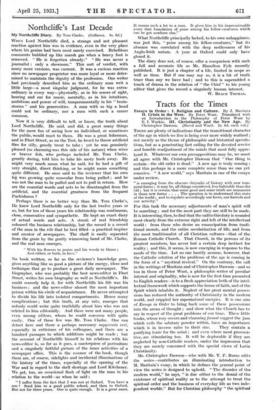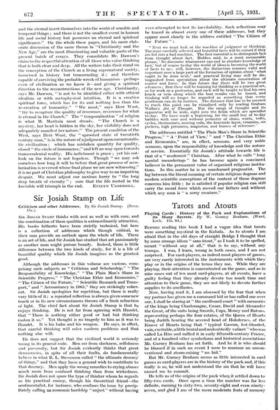Tracts for the Times
Essays in Order : I. Religion and Culture. By J. Maritain II. Crisis in the West. By Peter Wust. Translated with an Introduction to the Philosophy of Peter Wust by E. I. Watkin. III. Christianity and the New Age. By Christopher Dawson. (Sheed and Ward. 2s. 6d. each vol.) THERE are plenty of indications that the transitional character of the age in which we live is being ever more widely realized ; not merely as the theme of philosophic and historical specula- tions, but as a penetrating fact calling for the devoted service and humble readjustment of the minds that most fully appre- hend it. Whatever our own presuppositions may be, we must all agree with Mr. Christopher Dawson that " One thing is certain—the old order is dead." A new age is truly coming ; and this perhaps in a more complete sense than we can yet conceive. " A new world," says Maritain in one of the essays under review, " is emerging from the obscure chrysalis of history with new tem- poral forms ; it may be, all things considered, less habitable than the old ; but it is certain that some good and some truth are immanent in those new forms . . . . The question is to understand this state of the world ; and to regulate accordingly our loves, our hatreds and our activity."
For this task the necessary adjustments of man's spirit will be searching ; and for the most part they are still to be made. It is interesting, then, to find that the calltothis duty is sounded most clearly from the extreme right and left of the intellectual world : from those who desire an emancipation from tradi- tional morals, and the entire secularization of life, and from the most traditionalist of all Christian cultures—that of the Roman Catholic Church. That Church, in the persons of its greatest members, has never lost a certain deep instinct for reality ; and this, it seems, is now emerging in response to the needs of the time. Let no one hastily assume, however, that the Catholic solution of the problems of the age is coming in the form of a " mystical revival." On the contrary, the call in the writings of Maritain and of Christopher Dawson—and so too in those of Peter Wust, a philosophic writer of peculiar interest and originality, who is now for the first time presented to English readers—is to a fresh appreciation both of the intel- lectual framework which supports the house of faith, and of the Spirit which inhabits it. Neglect of her great mental posses- sions has reduced the authority of Christianity in the modern world, and crippled her supernatural energies. It is one aim
of Essays in Order to bring back some of these possessions
into the arena of thought ; and show what the Church has to say in respect of the great problems of our time. These little
books, whose rosy covers and charming format suggest the jam which veils the salutary powder within, have an importance which is in inverse ratio to their size. They contain a purifying tonic for the mind ; and even where most provoca- tive, are stimulating too. It will be deplorable if they are neglected by non-Catholic readers, under the impression that they are merely concerned with the special views of Latin
Christianity.
Mr. Christopher Dawson—who with Mr. T. F. Burns edits the series—contributes an illuminating introduction to M. Maritain's essay, in which he defines the general point of view the series is designed to uphold. " The disorder of the modern world," he says, " is due either to the denial of the existence of spiritual reality or to the attempt to treat the spiritual order and the business of everyday life as two inde- pendent worlds." But for Christian philosophy " the spiritual and the eternal insert themselves into the world of sensible and temporal things ; and there is not the smallest event in human life and social history but possesses an eternal and spiritual significance." On the whole these pages, and his more elab- orate discussion of the same theme in " Christianity and the New Age," are the most illuminating and valuable parts of the present batch of' essays. They consolidate Mr. Dawson's claim to the respectful attention of all those who value thinking that is both clear and deep. All the writers take their stand on the conception of the Church as a living supernatural society, immersed in history but transcending it ; and therefore capable of surviving the probable wreck of humanism—perhaps even of civilization as we know it—and giving a spiritual direction to the reconstructions of the new age. Christianity, says Mr. Dawson, " is not to be identified either with ethical idealism or with metaphysical intuition. It is a creative spiritual force, which has for its end nothing less than the re-creation of humanity." " We must," says Herr Wust, " try to recapture the quality of reverence, reverence for what is eternal in the Church." The " temporalization " of religion is what M. Maritain most dreads. " The Church is a mystery, her head is hidden in the sky, her visibility does not adequately manifest her nature." The present condition of the West, says Herr Wust, the " uprooted state of twentieth century man," is in the nature of a judgment upon ournaturalis- tic civilization ; which has mistaken quantity for quality, closed " the circle of immanence," and left no way open towards transcendental reality. His indictment is grave ; yet his out- look on the future is not hopeless. Though " we may ask ourselves how long it will be before that great process of secu- larization is reversed whose final phase we are now witnessing," it is no part of Christian philosophy to give way to an impatient despair. We must adjust our anxious hurry to " the long deep breath of eternity " ; sure that the life rooted in the
Invisible will triumph in the end. EVELYN UNDERHILL.







































 Previous page
Previous page